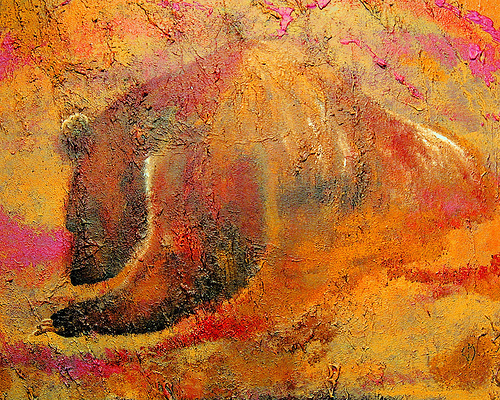
Cave Bear image cc Quicktiming
I just crawled out of my winter cave and discovered that it’s 2009. While I get back into the groove, here’s a few scientific articles released over the last few weeks on the subject of sleep disorders that you may have missed.
REM Disorder Linked to Alzheimer’s and Parkinson’s Diseases
First off, neurologists at the Sleep Disorders Center at Sacre-Coeur Hospital in Montreal reported that a REM sleep disorder may be an early warning of Alzheimer’s and Parkinson’s disease. REM behavior sleep disorder is a bizarre but not uncommon condition in which sleepers act out their dreams, due to the brain’s failure to immobilize muscles during the dream phase of sleep. This condition is most prevalent with men in their 50s, 60s and 70s, causing them to punch, kick or cry out while dreaming. Neurologist Ron Postuma explains the connection:
REM sleep behavior disorder is believed to be caused by a degeneration of the brain stem ” similar to the degeneration that occurs in Parkinson’s and Lewy body dementia.
Read the entire article here.
Sleeplessness and Heart Disease
Next, the New York Times reported that researchers from the University of Chicago Medical Center have found a correlation between sleeplessness and heart disease. Essentially, people who don’t get much sleep are at greater risk for developing calcium deposits in their coronary arteries.
The researchers say that there may be a third factor in play. However, sleep has a heavy hand to play in reducing blood pressure, anxiety levels, and the release of stress hormones, so it’s possible that not getting enough sleep is directly increasing the risk of heart disease through these factors.
Here’s the full article about heart disease and sleeplessness.
Insomnia and Alcohol – Bad Combination
Finally, researchers at Laval University in Quebec announced that Canadian insomniacs spend more on alcohol than on sleep meditations and doctor’s visits combined.
Insomniacs in that Canadian province spend an annual $275 million ($340 million Canadian) on alcohol to lull them to sleep at night compared with $14.7 million on over-the-counter and prescription sleep meds and $69.4 million on insomnia-related health care consultations. Simply put, the sleepless in Quebec spend over three times more on alcoholic “sleeping aids” than on medical interventions specifically designed to promote z”s”even though alcohol is more expensive.
Alcohol has a drowsing effect in the short-term, but actually drinking before bed limits the amount of deep sleep you get. Deep sleep is stage IV sleep, and without it we don’t wake up with that “refreshed” feeling, no matter how many good dreams we may have had. So in the long term, a few “night caps” can aggravate the insomnia rather than helping it.
Here’s the full article on sleeplessness and alcohol.
While ya’ll dig into that, I’ll shake off my grizzly suit and get a cup of coffee.
The introduction of alcohol induces sleep quickly. However, it also begins to instantly dehydrate your body. The result is a fitful sleep that stops short of REM required for a deep, rejuvenating rest. Instead, you will most likely wake just several hours after falling asleep. The reason? Your body needs water. So, despite what you may think, alcohol and insomnia is one of the worst combinations.
one natural treatment i know for insomnia is L-Trytophan and Valerian Root. i tried it and it they worked.
L-tryptophan also works well for insomnia. just take one 500 mg pill 2 hours before sleeping.
Important topics, Ryan. I would hasten to add that depression and sleep disorders are linked. I really think you are on to something with dreamstudies.org, consciousness and health. Best, Seth
Hi Friends and Ryan, I would also like to recommend drinking milk before bed time. It has L-tryptophan that promotes sleep. Drinking Milk before Bed time really Helps.
As an addictions counselor, I learned that alcohol is first a depressant, but that for every “down” there must be an “up.” Therefore after a couple of hours, the alcohol begins to leave the body and the body rebounds and we often wake up just when we’d be sleeping soundly if we hadn’t drank. People with Lewy body disorders are highly prone to REM Sleep Behavior Disorders. Giving them even a single drink “to help them sleep” is not a good idea. When the alcohol starts to leave and they can begin to dream, the dreams can be much more active, more violent, more scary.